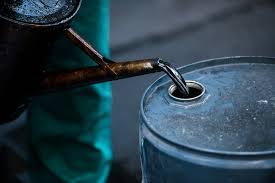Oil continued its losses after the White House imposed the first tranche of sanctions, impacting $110 billion (Dh404bn) of Chinese goods on Sunday and Beijing retaliated with duties on US crude.
Brent traded at $59.07 per barrel at 12.15pm UAE time as markets remained depressed after there appeared to be no let-up in the trade war between the world’s two biggest economies.
A category five storm set to make landfall on the US East coast is also likely to keep prices in check.
Hurricane Dorian, which made landfall in the Bahamas today, is one of the most powerful storms ever observed in the Atlantic Ocean. It is expected to sweep across the US East Coast including Florida.
The Gulf of Mexico, America’s key oil-producing region that accounts for 16 per cent of crude output and 45 per cent of the country’s refining capacity, is not expected to be impacted.
However, the storm is expected to have an impact on demand, driving prices down.
The start of the latest Trump administration trade offensive against China is also expected to keep demand in check, outweighing any bullish sentiments from declining inventories and rigs in the US.
West Texas Intermediate was also trading in the negative at $55.03 at 12.15pm UAE time after losing considerable ground by the end of last week.
The benchmark, which tracks largely North American crude grades, fell 2.8 per cent to finish the week at $55.10 per barrel.
“This move was in contrast to a second consecutive week of hefty rig count declines in the US, with oil rigs in shale plays falling by 10 w-o-w, bringing the downside to 26 over the last two weeks alone,” JCB Energy said in a note citing data from US energy services firm Baker Hughes.
Output for July also pointed to a contraction in supply by 33,000 barrels per day, according to the Energy Information Authority.
The response to the latest tariffs, which largely include consumer goods, has been muted, JCB said, citing China’s purchasing manager index, which rose 50.4 over August.
OPEC, which along with non-member allies led by Russia, is undertaking 1.2 million bpd cuts through to March has meanwhile has boosted production for the first time this year.
High production from members Iraq and Nigeria led to the surge despite restraint from its biggest producer Saudi Arabia, which has cut more than its quota to keep markets balanced. Saudi crude oil production dropped 2 per cent in July to 9.6 mbpd, the lowest level of output since August 2014.
Data from Reuters showed production by the exporters’ group was up 80,000 bpd in August to reach 29.61 mbpd.
Saudi Arabia last week decoupled the industry and mineral resources portfolio from its energy ministry, forming a separate ministry as it looks to streamline efforts to prepare its state oil company for an initial public offering.
Saudi Aramco, which is expected to list on the domestic exchange later this year and a foreign exchange in 2020 or 2021, needs higher oil prices to remain profitable.


